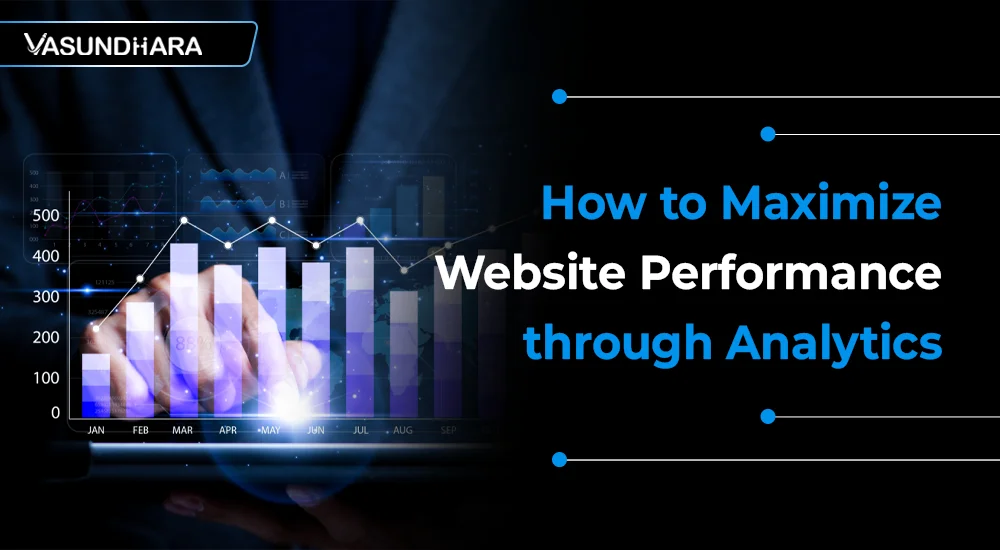In the dynamic online business landscape, having a website is the first step toward success. To truly thrive in the digital realm, understanding and leveraging website analytics is paramount.
Analytics offer invaluable insights into user behavior, site performance, and marketing effectiveness, enabling informed decision-making and continuous improvement strategies.
What is Website Performance?
Website performance refers to how well a website functions and delivers a satisfactory user experience to its visitors. It encompasses various aspects, including speed, responsiveness, reliability, and overall efficiency of a website.
Website performance is crucial for retaining visitors, improving search engine rankings, and achieving business goals. Analyzing and optimizing performance metrics through tools and analytics helps website owners enhance the overall user experience and achieve better online success.
Why Analytics Matter for Your Website?
Understanding User Behaviour: Analytics provide detailed information about how visitors interact with your website, including which pages they visit, how long they stay, and where they drop off. This knowledge helps in optimizing the user experience and content to better meet their needs.
Measuring Performance: By tracking key metrics such as traffic, conversion rates, and bounce rates, analytics offer a clear picture of your website's performance. Identifying strengths and weaknesses allows for targeted improvements to enhance overall effectiveness.
Data-Driven Decision Making: Analytics empower you to make informed decisions based on real data rather than guesswork or intuition. Whether it's refining marketing strategies, adjusting website design, or prioritizing content, analytics provide the insights needed to drive success.
Benefits of Using Analytics
By understanding how users navigate your site, you can optimize layout, navigation, and content to provide a seamless and engaging experience, increasing satisfaction and loyalty.
Analytics help identify high-performing keywords, popular content, and areas for optimization, allowing you to tailor your SEO efforts for maximum visibility and organic traffic growth.
By analyzing conversion funnels and identifying bottlenecks, you can make targeted adjustments to optimize the user journey, resulting in higher conversion rates and improved ROI.
Analytics enable you to track the effectiveness of your marketing campaigns in real-time, allowing for adjustments to maximize ROI and allocate resources more efficiently.
How to Leverage Analytics Effectively
Define specific, measurable objectives for your website, such as increasing sales, generating leads, or boosting engagement. This will guide your analytics strategy and ensure focus on relevant metrics.
There are various analytics tools available, ranging from Google Analytics for comprehensive website tracking to specialized tools for specific purposes like heatmaps, A/B testing, and user session recordings. Select tools that align with your goals and budget.
- Regular Monitoring and Analysis:
Schedule regular reviews of your analytics data to track progress toward your goals, identify trends, and uncover areas for improvement. Adjust your strategies accordingly to optimize performance continually.
Implement A/B tests and experiments to systematically evaluate different strategies and hypotheses. Use data-driven insights to refine your approach iteratively for optimal results.
Boosting Sales with Analytics
- Identify High-Performing Products:
Analyze sales data to identify top-selling products, popular categories, and customer preferences. Use this information to optimize product positioning, pricing, and promotions for maximum impact.
- Personalize the Shopping Experience:
Leverage user data and behavior analytics to deliver personalized recommendations, targeted offers, and tailored content that resonate with individual customers, driving conversion and loyalty.
- Optimize Checkout Process:
Analyze conversion funnels to identify friction points in the checkout process and streamline it for a smoother, more seamless experience. Simplify forms, offer multiple payment options, and implement guest checkout to reduce abandonment rates and boost sales.
- Track and Attribute Sales:
Use analytics to track the customer journey from initial touchpoint to conversion, attributing sales to specific marketing channels, campaigns, and interactions. This insight helps optimize marketing spend and allocate resources effectively.
Top Analytics Tools
A comprehensive web analytics platform offering many features for tracking website traffic, user behavior, and conversion metrics.
Provides heatmaps, session recordings, and user surveys to visualize and understand user behavior on your website.
A/B testing platform for experimenting with different variations of web pages to optimize performance and user experience.
Offers heatmaps, scrollmaps, and user recordings to uncover insights into how users interact with your website and identify areas for improvement.
All-in-one marketing platform with robust analytics capabilities for tracking website performance, marketing campaigns, and customer interactions.
Conclusion
In today's digital age, leveraging website analytics is essential for maximizing performance, optimizing user experience, and driving business growth.
By understanding user behaviour, measuring web page performance, and making data-driven decisions, you can unlock the full potential of your website, boost sales, and stay ahead of the competition.
With the right tools, strategies, and a commitment to continuous improvement, analytics can be a powerful ally in achieving your online objectives.
Revolutionize your online presence with Vasundhara Infotech's expert guide on maximizing website performance through analytics!
Ready to get started? Contact us today and embark on your journey to digital excellence!




